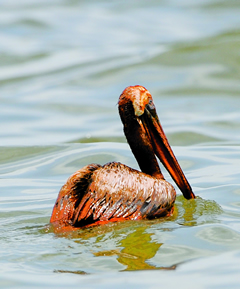The BP oil spill in the Gulf of Mexico, by far the largest in American history, has poisoned the waters and marshlands of the region, killed countless birds and marine animals and thrown thousands of people in the fishing industry out of work. Stephen Scharper, a professor of anthropology at U of T Mississauga and at U of T’s Centre for Environment, spoke with Paul Fraumeni, director of research communications, about how the catastrophic spill might have been averted.
You have advocated that decision-makers adhere to the “precautionary principle.” What is this?
By using the precautionary principle, you anticipate potential harm, based on scientific and other evidence, to the environment and human communities from any kind of activity. The principle says you don’t need absolute scientific evidence that an activity is going to bring harm; you can have suggestive scientific evidence. Therefore, you put in safeguards, such as is the case with automobiles.
How does the precautionary principle relate to the Gulf of Mexico oil spill?
There is a lot about this oil spill that is disturbing, and which indicates that decision-makers didn’t follow the precautionary principle. It has been revealed, for example, that the Mineral Management Service, the group responsible for overseeing drilling in the United States, is also the group responsible for encouraging offshore oil drilling – and collecting the royalties from it. Thankfully, the Obama administration separated these
responsibilities, and the director of the service resigned.
The New York Times and other news organizations have reported that the service’s inspectors received gifts from oil companies. In some cases the companies were allowed to write their own inspection certificates and reports. MSNBC has stated that permits were not required to build and install the Deepwater Horizon oil rig; government oversight was absent.
The precautionary principle may not have been followed during the cleanup either. In May, the Environmental Protection Agency warned that the chemical being used to disperse the oil in the Gulf and the wetlands of Louisiana was harmful and ordered BP to stop using it.
The public outrage over this spill seems greater than with the Exxon Valdez disaster off the coast of Alaska in 1989. Why do you think this is?
The Gulf spill hit a traditional mainland area that affects millions of people and billions of dollars worth of business in fishing and tourism. “Deep ecology” celebrates wilderness and the intrinsic value of nature. “Social ecology” looks at how environmental damage affects people and social communities. What’s interesting with this spill is that it blends concerns from social ecology with deep ecology. That’s one reason it’s received so much media attention.
Will this be a watershed? In time, will this disaster change things for the better?
It’s too early to tell. Some people will continue to see these spills as a necessary evil as the U.S. attempts to reduce its dependence on foreign oil. What might turn people around is the fragility of the Gulf ecosystem. I was heartened that President Obama implemented a six-month moratorium on coastal drilling. This is where we have to put pressure on decision-makers. In Canada, we have potentially the same risk with the offshore oil rigs near Newfoundland and proposals for drilling in the Beaufort Sea. Something similar could happen here very easily if we do not demand stringent precautionary measures.





